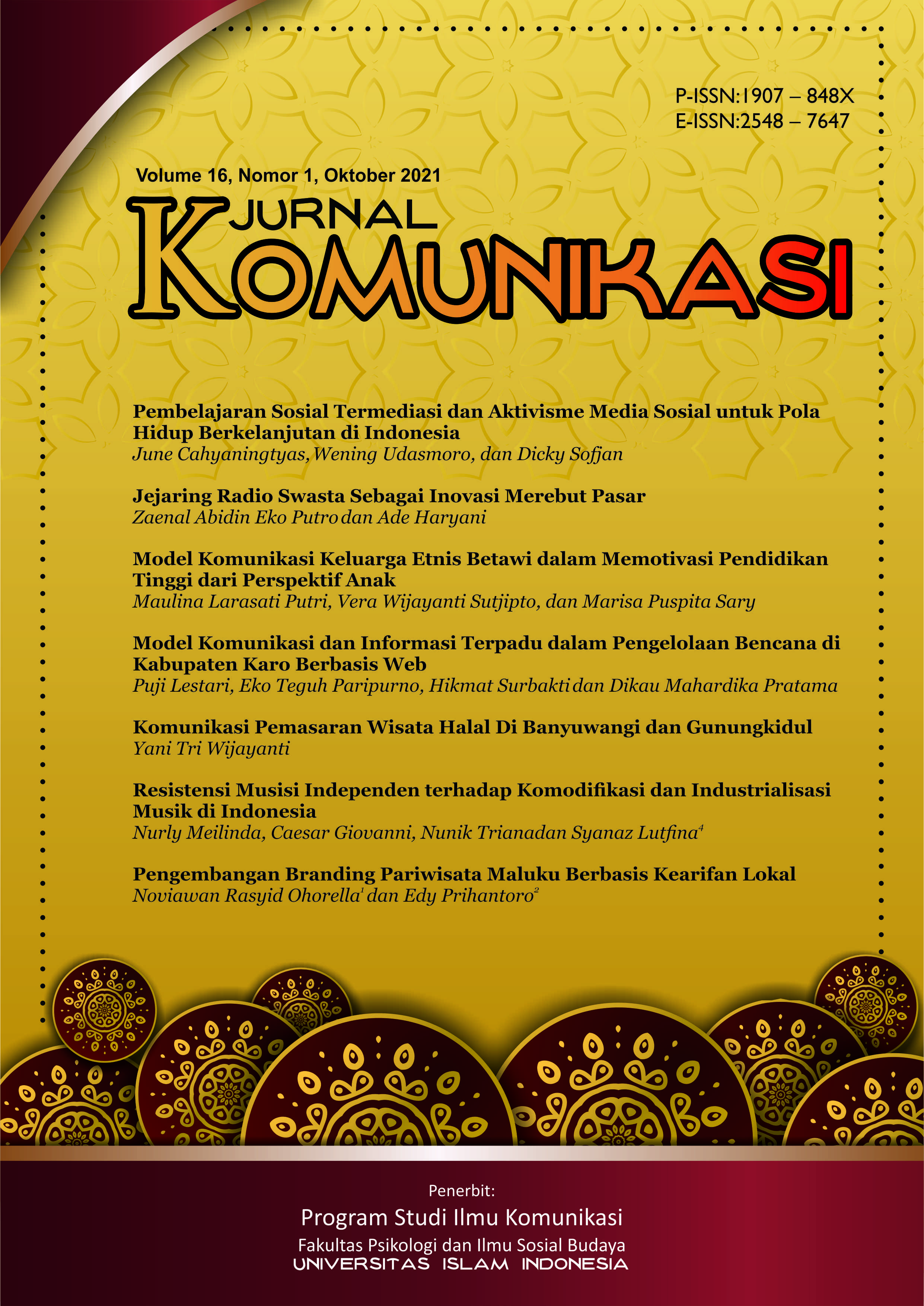Main Article Content
Abstract
Communication in the family plays an important role in providing motivation for the development of children's education and in determining the continuation of higher education for children. This study aims to determine the communication model that exists in Betawi ethnic families in motivating higher education for children. This research is qualitative. Data were collected through interviews, literature study, and observation. The informants of this study consisted of six students who had parents with ethnic Betawi family backgrounds. Three informants lived in the DKI Jakarta area and three other informants lived in the Depok area. The results of this study indicate that the Betawi ethnic family communication model in an effort to motivate children to continue their education to a higher level is in accordance with the ABX model proposed by Newcomb and the Interactional model. In the ABX model from Newcomb, both parents and children consider higher education to be very important. Then, in the interactional model, communication that takes place in families with Betawi ethnic backgrounds takes place openly and reciprocally. This study suggests that communication built by parents has an impact on motivation in children which then affects children's behavior, especially in terms of education. Therefore, parents must develop a good communication environment with their children.
Keyword : Communication of Family, Model of Communication, Motivation
Article Details
Authors who publish with this journal agree to the following terms:
- Authors retain copyright and grant the journal right of first publication with the work simultaneously licensed under a Creative Commons Attribution License that allows others to share the work with an acknowledgement of the work's authorship and initial publication in this journal.
- Authors are able to enter into separate, additional contractual arrangements for the non-exclusive distribution of the journal's published version of the work (e.g., post it to an institutional repository or publish it in a book), with an acknowledgement of its initial publication in this journal.
- Authors are permitted and encouraged to post their work online (e.g., in institutional repositories or on their website) prior to and during the submission process, as it can lead to productive exchanges, as well as earlier and greater citation of published work (See The Effect of Open Access).
References
- Buku:
- Djamarah, Syaiful Bahri. 2004. Pola Komunikasi Orang Tua dan Anak dalam Keluarga: Sebuah Perspektif Islam. Jakarta: PT. Rineka Cipta
- Djamarah, Syaiful Bahri. 2018. Pola Asuh Orang Tua dan Komunikasi Dalam Keluarga: Upaya Membangun Citra Membentuk Pribadi Anak. Jakarta: PT. Rineka Cipta
- Moleong, Lexy J. 2005. Metodologi Penelitian Kualitatif, Bandung: Remaja Rosdakarya
- Lestari, Sri. 2012. Psikologi Keluarga: Penanaman Nilai dan Penanganan Konflik dalam Keluarga. Jakarta: Kencana
- Vangelisti, Anita L. 2009. Handbook of Family Communication. New Jersey: Lawrence Erlbaum Associates
- Nawawi, Handri. 2003. Manajemen Sumber Daya Manusia untuk Bisnis yang Kompetitif. Yogyakarta: Gadjah Mada University Press
- Syaiful, B. 2004. Guru dan Anak Didik dalam Interaksi Edukatif. Jakarta: Rineka Cipta.
- Saiful Bahri, Moh 2018. Pengaruh Kepemimpinan, Lingkungan Kerja, Budaya Organisasi, Motivasi Terhadap Kepuasan Kerja Yang Berimplikasi Terhadap Kinerja Kerja Dosen. Surabaya: CV. Jakad Publishing Surabaya
- Artikel Jurnal:
- Candra, & Sakban, A. 2017. Hubungan Antara Pola Komunikasi Orang Tua dengan Motivasi Belajar Siswa di SMAN 1 Labuapi Lombok Barat. JUPE: Jurnal Pendidikan Mendala Vol.2 No.2, 82-86.
- Fitriyah, Mahmud ZA. 2018. Konsep Pendidikan Anak Pada Masyarakat Betawi. Jurnal Harkat: Media Komunikasi Gender, 14 (1), 59-74. DOI:10.15408/HARKAT.vl4il.10401
- Saleh, Minhayati. 2014. Pengaruh Motivasi, Faktor Keluarga, Lingkungan Kampus Dan Aktif Berorganisasi Terhadap Prestasi Akademik. Jurnal Phenomenon 4 (2). 109-141
- Satriya, Raga Bagus. 2019. Seni sebagai Media Dakwah Pembinaan Akhlak. Jurnal Komunikasi Volume 13, Nomor 2, April2019, Hal 201-210 DOI: https://doi.org/10.20885/komunikasi.vol11.iss1.art1
- Pandia, Winny Harismayani, Abdul Munir & Azhar Azis. 2017. Hubungan Harga Diri Siswa Dan Pola Asuh Demokratis Orang Tua Dengan Motivasi Belajar Siswa. Jurnal Analitika 7 (2), 80-87
References
Buku:
Djamarah, Syaiful Bahri. 2004. Pola Komunikasi Orang Tua dan Anak dalam Keluarga: Sebuah Perspektif Islam. Jakarta: PT. Rineka Cipta
Djamarah, Syaiful Bahri. 2018. Pola Asuh Orang Tua dan Komunikasi Dalam Keluarga: Upaya Membangun Citra Membentuk Pribadi Anak. Jakarta: PT. Rineka Cipta
Moleong, Lexy J. 2005. Metodologi Penelitian Kualitatif, Bandung: Remaja Rosdakarya
Lestari, Sri. 2012. Psikologi Keluarga: Penanaman Nilai dan Penanganan Konflik dalam Keluarga. Jakarta: Kencana
Vangelisti, Anita L. 2009. Handbook of Family Communication. New Jersey: Lawrence Erlbaum Associates
Nawawi, Handri. 2003. Manajemen Sumber Daya Manusia untuk Bisnis yang Kompetitif. Yogyakarta: Gadjah Mada University Press
Syaiful, B. 2004. Guru dan Anak Didik dalam Interaksi Edukatif. Jakarta: Rineka Cipta.
Saiful Bahri, Moh 2018. Pengaruh Kepemimpinan, Lingkungan Kerja, Budaya Organisasi, Motivasi Terhadap Kepuasan Kerja Yang Berimplikasi Terhadap Kinerja Kerja Dosen. Surabaya: CV. Jakad Publishing Surabaya
Artikel Jurnal:
Candra, & Sakban, A. 2017. Hubungan Antara Pola Komunikasi Orang Tua dengan Motivasi Belajar Siswa di SMAN 1 Labuapi Lombok Barat. JUPE: Jurnal Pendidikan Mendala Vol.2 No.2, 82-86.
Fitriyah, Mahmud ZA. 2018. Konsep Pendidikan Anak Pada Masyarakat Betawi. Jurnal Harkat: Media Komunikasi Gender, 14 (1), 59-74. DOI:10.15408/HARKAT.vl4il.10401
Saleh, Minhayati. 2014. Pengaruh Motivasi, Faktor Keluarga, Lingkungan Kampus Dan Aktif Berorganisasi Terhadap Prestasi Akademik. Jurnal Phenomenon 4 (2). 109-141
Satriya, Raga Bagus. 2019. Seni sebagai Media Dakwah Pembinaan Akhlak. Jurnal Komunikasi Volume 13, Nomor 2, April2019, Hal 201-210 DOI: https://doi.org/10.20885/komunikasi.vol11.iss1.art1
Pandia, Winny Harismayani, Abdul Munir & Azhar Azis. 2017. Hubungan Harga Diri Siswa Dan Pola Asuh Demokratis Orang Tua Dengan Motivasi Belajar Siswa. Jurnal Analitika 7 (2), 80-87




